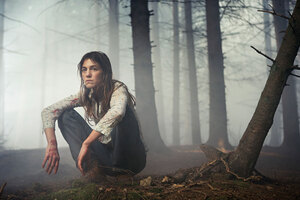The second coming of the horror genre
In Antichrist, a self-disemboweling fox utters the phrase, “Chaos reigns.”
Director Lars von Trier makes sure it really does, by illustrating every brutal detail necessary on screen and demonstrating just how horrifying chaos can be.

Dirt devil · Charlotte Gainsbourg stars in Antichrist. Gainsbourg won the Best Actress award at the Cannes Film Festival for her performance. - Photo courtesy of IFC Films
The movie stars Willem Dafoe and Charlotte Gainsbourg as He and She, a couple whose young son falls to his death out of a window while they are passionately having sex.
To counter the excruciating grief that follows, the couple decide to find sanctuary in their desolate cabin in a forest known as Eden. He, a therapist, attempts to help his wife by having her overcome her grief, but the grief is too much and She easily succumbs to it, propelling her towards horrendous violence and a horrifying climax.
Von Trier’s film is not the typical Hollywood horror affair because the director has his own sadistic, yet fresh perspective on how far horror can go. Instead of a dignified monster, the true horror comes from the many dimensions of fear and its capabilities to gruesomely disturb one’s consciousness. Von Trier’s villain is very real, and its roots form in psychology.
The film highlights fear’s effect on the body and mind, most specifically with She. She changes dramatically throughout the film, expressing radical contortions of sanity and stability, and, in order to convey such distortions of pain, von Trier made an excellent decision casting Gainsbourg. The often underrated actress shines in this grim narrative, her performance reaching far beyond boundaries that many Hollywood A-list actors would never dare cross.
Antichrist demands its actors to stand naked in the face of fear — figuratively and literally — and ultimately succumb to it, and Gainsbourg does just that. As the centerpiece of the film, Gainsbourg — who won the Best Actress award at the Cannes Film Festival for her performance — endures most, but certainly not all, of the trauma that accompanies grief; to watch her immerse herself completely in something so horrible is feverishly thrilling to watch.
Dafoe counters Gainsbourg flawlessly with a supposed knowledge of the power of fear, but his insecurities soon get the better of him as well. The real charm to his performance is in his reactions to She; this is where his encounters with fear evoke the same horror within him.
Although both actors give fearlessly raw performances that truly make the film, Antichrist struggles with its own madness. Von Trier illustrates fear and its distortions through some of the most sadistic forms of bodily and psychological horror ever to be depicted on screen. The ludicrous and often very vile actions the two characters find themselves undertaking are erratically disturbing and often difficult to sit through.
As disturbing as these scenarios are, though, the mayhem eventually culminates into fascinating causation, but it is unfortunately overshadowed by the film’s tremendous amount of graphic violence. In relation to the overall meaning of Antichrist, every single depraved act is essential but not easily interpreted — that, of course, is a result of the extremity of the sadism. The grotesque imagery, while still unique, brings up many concerns, most notably that of misogyny as well as questions regarding the excessive use of traumatic images. Antichrist becomes lost here, amongst itself and it is very hard for it to find its way, even after the conclusion.
Most importantly, though, Antichrist says a great deal about the nature of mainstream films. As graphic and gruesome as it is, the film takes considerable risks. There is not a single film out right now that can compare to the intensity of Antichrist.
Although not for the faint of heart, this expression of horror will literally cause physical and emotional reactions to a degree no other contemporary horror film can match; by enduring the same notions of fear the characters do, the movie-watching experience changes significantly.
It is hard to find a film with such capabilities, and it is here that the importance of Antichrist as a film becomes prominent. There is really no telling when such an occurrence in film will happen again.
